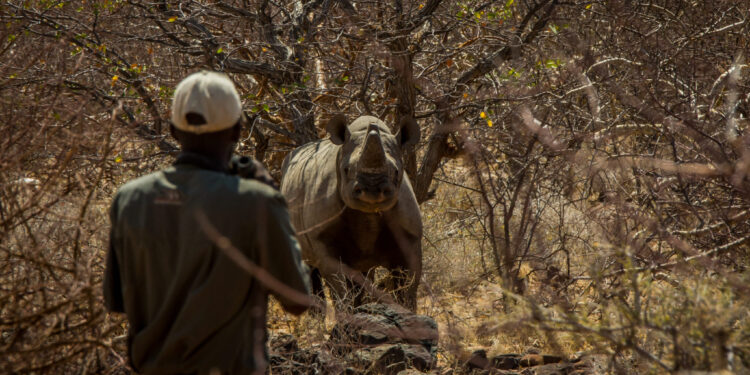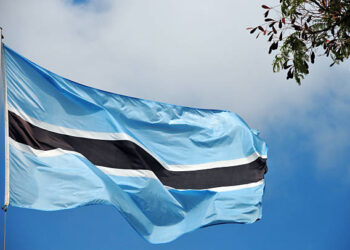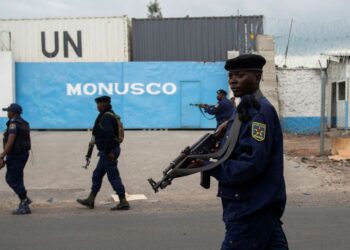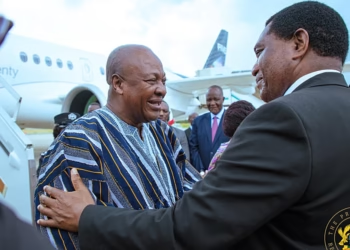Namibia, an arid country with large tracts of desert and renowned for its breathtaking landscapes, diverse wildlife, and rich cultural heritage, faces a multitude of environmental threats that jeopardize its natural treasures and the well-being of its people. This beautiful nation, which has the unique feature of the desert sitting side by side with the ocean, is faced with an environmental threat that stems from a combination of human activities and natural phenomena. This demands concerted conservation efforts to safeguard the spectacular environment and the nation’s unique ecosystems.
The Impact of Climate Change on Namibia’s Ecosystems
Climate change is a global phenomenon, and it is affecting every facet of the daily lives of people worldwide. Namibia, the southern African nation home to a variety of wildlife, including lions, elephants, rhinos, giraffes, and so many more, with a diverse range of habitats, including the Namib Desert, Etosha National Park, and the Skeleton Coast, is currently facing its share of the impacts of climate change on its ecosystems, and the results are devastating. According to the BBC (2019), Africa has contributed the least to climate change, but it is the hardest hit by its impact.
One of the impacts of climate change in Namibia is drought and water scarcity. The semi-arid country has been experiencing increasing drought conditions in recent years, which is affecting its wildlife and people. The lack or scarcity of water is causing animals to die of thirst or migrate to other areas in search of water. In the course of migration, they may come into contact with humans, which may stir conflict, resulting in these animals being hunted excessively. The shrinking vegetation, which serves as their main food source, is also dying off, causing a strain on the food available for these wild animals. Drought is also increasing the risk of the spread of diseases among wildlife populations.
The drought is also causing a severe shortage of water for drinking, cooking, and sanitation, which is leading to an increase in disease outbreaks among humans. This also affects the economy of those affected. According to a 2022 report by the International Federation of Red Cross and Red Crescent Societies (IFRC), during periods of drought, women spend more time searching for water for household use and livestock, limiting their participation in economic activities. The lack of water is also negatively impacting agriculture, which is a key source of food and income for many people. Consequently, drought is also leading to an increase in the migration of people from rural areas to cities, putting pressure on the city’s social amenities and its limited water resources and infrastructure. In addition, water scarcity is also leading to conflict between different groups of people living in the same locality, which initially lived in peace and harmony while sharing water and other resources.
Another impact of climate change is the rise in sea levels. Namibia has a long coastline that is vulnerable to sea level rise. Sea level rise is directly affecting coastal communities and infrastructure, causing coastal erosion and threatening coastal homes. It is also impacting coastal ecosystems such as mangroves and wetlands. These ecosystems, which serve as flood protection, carbon sequestration, and habitat for wildlife, are under severe threats from sea level rise exacerbated by climate change. Coastal erosion and sea level rise combined are leading to saltwater intrusion into freshwater sources such as rivers and aquifers. This in turn is reducing the availability of freshwater in these coastal areas, leading to drought.
Climate change has also resulted in a change in the rainfall patterns in Namibia. The country has a highly variable climate, with long dry seasons and short but intense wet seasons. The changing rainfall patterns have made it difficult to accurately predict when rainfall will occur and for how long. This has caused extreme weather events such as floods and droughts to become more common. This in turn is affecting food production, water availability for industrial and domestic use, and the health of ecosystems. Changing rainfall patterns have also led to a shift in the distribution of different plant and animal species, impacting biodiversity negatively.
The changes in the timing of seasonal rains are also having a major impact on wildlife and ecosystems, such that when the timing of wet seasons, which is important for the breeding of many species of birds and insects, starts late or ends early, it would significantly impact breeding success. The changes in seasonal rains are also affecting the annual cycle of plants, which can have a negative impact on the food chain.
The agricultural sector of the country has also been negatively impacted, with increased droughts leading to crop failure and livestock deaths, causing food insecurity and economic hardship. Traditional farming practices aren’t spared from this carnage; rain-fed agriculture and pastoralism are badly affected.
In essence, the environment, the flora, and the fauna are all impacted by the menace of climate change.
The Impact of Poaching on Wildlife Populations
Poaching is becoming a serious threat to wildlife populations and to the environment. Due to excessive hunting, many animals have become endangered, and some have been driven into extinction. In recent years, Namibia has experienced a surge in poaching for rhino horn, elephant ivory, and other wildlife products. The result of this is a noticeable decline in the number of these iconic species. The population of black rhinos, elephants, and lions isn’t what it used to be five decades ago.
Unfortunately, the demand for wildlife products such as lions, rhinos, and elephants has created an illegal black market, which has continued to fuel poaching activities, negatively impacting wildlife. The high demand for these wildlife products is driven by various factors, such as the belief that they have medicinal properties and the use of ivory as a status symbol. The hunting of wildlife such as black rhinos has led to their decline, making them critically endangered. In 2021, 45 black rhinos were poached in Namibia, while in 2022, 87 were poached for their horns (Somerville, 2023). Poaching has also led to a disruption in the natural balance of the ecosystem, producing a ripple effect on other species.
Poaching not only has a negative impact on wildlife populations, but it also has a number of social and economic costs—it undermines tourism, which is a major source of revenue for Namibia. It has also exacerbated poverty and food insecurity in rural communities due to its ripple effect.
The impact of poaching on wildlife cannot be overemphasized. Concerted efforts are needed to curb the indiscriminate destruction of these iconic wildlife populations.
The Impacts of Habitat Loss on the Wildlife Population
While climate change and poaching pose a serious environmental threat in Namibia, another environmental hazard worthy of note is habitat loss and its impact on wildlife populations. When the natural habitats of wildlife are destroyed or altered by human activities or natural phenomena, the important resources and conditions that wildlife need to survive and thrive are disrupted, leading to a series of negative impacts that in turn pose a serious threat to biodiversity and ecosystem stability.
According to the World Wide Fund for Nature Namibia, the biggest threat to wildlife is human impact on the environment. Habitat loss fragments populations, reducing their size and increasing their risk of extinction. Some of these wildlife are social creatures, but when their habitats are destroyed, individuals are isolated, reducing their ability to find mates, food, and shelter. This results in a severe population decline and increased vulnerability to extinction. Migratory patterns are also disrupted for species that require specific habitats for breeding, resting, and feeding along their migratory routes. These species are forced to alter their routes or find alternatives, which may not be suitable for them. This can lead to an increase in mortality and a decrease in reproduction.
Habitat loss also exposes wildlife, making them vulnerable to predation and competition. As wildlife is forced into smaller areas, alien to their original habitats, they are exposed to predation and competition from other species. This can bring about a decline in their populations and a reduction in diversity. Ecosystem functions such as pollination, nutrient cycling, and seed dispersal are also altered, leading to a disruption in the natural flow of ecosystem functions.
The impacts of habitat loss on wildlife also have a ripple effect; they can cause the spread of invasive species, increase human-wildlife conflict, and reduce ecosystem resilience against natural disturbances such as wildfires, droughts, and floods. This also calls for urgent attention as habitat fragmentation, disruption, and loss continue to occur at an alarming rate.
Conservation Efforts in Protecting the Environment
Namibia, without a doubt, is a land of beauty and diversity in wildlife. Its environment, however, continues to face a number of challenges, including climate change, poaching, and habitat loss. The country nonetheless is making significant efforts to rise to these challenges, and progress is being recorded.
Namibia has established a network of protected areas, which includes national parks, game reserves, and conservancies, which cover over 37% of its land area (Index Mundi, 2021). The country has also enacted a number of laws and policies to protect wildlife and promote sustainable use of its natural resources. One of Namibia’s successful conservation initiatives is the establishment of community conservancies. Here, local communities are given the right to manage and benefit from their natural resources. This approach has, over time, proven to be effective against poaching and promoting sustainable development.
Namibia has the largest population of black rhinos in the world, and it is making giant strides in rhino conservation, working hard to protect these critically endangered animals. The Namibian government, in addressing poaching, has increased law enforcement and the use of technology to monitor wildlife populations. In 2021, the government launched the National Rhino Conservation Strategy, which aims to reduce poaching and increase the black rhino population to 500 by 2045. The government is also working with local communities to develop sustainable livelihoods that do not rely on poaching. Successes have been recorded, and the number of Namibia’s black rhinos is increasing (IRF, 2023).
In addition to its efforts to protect wildlife, Namibia is also working to address climate change. The country has set ambitious goals to reduce greenhouse gas emissions and increase the use of renewable energy. The country is also working on adaptability, adjusting to the impacts of climate change such as drought and flooding.
Namibia’s conservation efforts and its commitment to environmental protection are making a real difference. There are, however, still many challenges, and the international community can play a very important role in supporting Namibia’s conservation efforts. For example, consumers can help by refusing to buy wildlife products and instead choosing products that are made sustainably and do not harm the environment.
In addition, governments can also assist by providing financial and technical support to Namibia’s conservation initiatives.
The Role of Ecotourism in Promoting Conservation
Ecotourism plays a very important role in promoting conservation in Namibia. It provides a sustainable source of income for local communities and, in turn, encourages them to protect their natural resources. Ecotourism also helps to raise awareness about the importance of conservation and promote responsible travel.
Ecotourism is a booming business, especially for a place like Namibia, which is endowed with a natural environment for it to thrive, generating significant economic benefits for the country. In 2019, the tourism industry in Namibia contributed 11% to Namibia’s GDP and employed over 17,000 people (Statista, 2022). Ecotourism has been particularly beneficial to rural communities where this wildlife is in situ, providing much-needed income and employment opportunities for locals.
The use of the Community-Based Natural Resource Management (CBNRM) model gives local communities the right to manage and benefit from their natural resources. This model is a very effective way to reduce poverty in these communities, empower these communities, and promote conservation. Ecotourism has also helped raise awareness about the importance of conservation. Tourists learn about the country’s unique biodiversity as well as the threats it faces, inspiring them to take action and protect the environment in their own communities. Ecotourism has also promoted responsible travel, reducing waste, conserving water, and respecting wildlife, thus addressing the negative impact of tourism on the environment.
Namibia boasts a range of ecotourism activities, which include wildlife watching, where visitors go on game drives, boat trips, and guided walks to see these animals in their natural habitats. The Namib desert is one of the most beautiful deserts in the world, with its unique contrasting view of the ocean. Visitors can explore its landscape, animals, and plants in their natural environment. Namibia’s cultural heritage is also being promoted by ecotourism, which allows visitors to learn about the country’s rich history, culture, traditions, and people.
The potential of ecotourism to promote conservation in Namibia is great. It is raising awareness about the importance of conservation, providing economic benefits to local communities, and promoting responsible travel. Ecotourism would help protect Namibia’s natural resources for future generations.
In conclusion, all hands must be on deck to tackle the climate crisis, poaching, and habitat destruction and loss, as well as promote conservation efforts. Together, we can protect Namibia’s natural resources, its environment, and its people. The world is a global village, where issues affecting one affect the rest of us. Together, we can protect the environment, for it is ours to protect and preserve for the next generation.
ــــــــــــــــــ
Reference
IFRC. (2022). International Fedration of Red Cross: Namibia Drought Assessment Report. Retrieved from https://www.ifrc.org/sites/default/files/2022-08/Namibia-drought-assessment-report-2022.pdf
BBC. (2019). “How Africa will be affected by climate change.” Retrieved from https://www.bbc.com/news/world-africa-50726701.amp
WWF Namibia. (2023). “WILDLIFE: WHY DOES IT MATTER?”. Retrieved from https://shorturl.at/ckLTY
Keith Somerville. (2023). “Poaching in Namibia almost doubles in 2022”. Retrieved from https://shorturl.at/fTVX1
Index Mundi. (2021). Namibia – Terrestrial protected areas (% of total land area) Retrieved from https://shorturl.at/nsPUX
International Rhino Foundation, IRF (2023). “State of the Rhino Update: Rhino Poaching Nearly Doubles in Namibia.” Retrieved from https://shorturl.at/ixHX9
Statista. (2022). “Contribution of Travel and Tourism to Total Employment in Namibia 2019-2020.” Retrieved from https://shorturl.at/aGR26



























































